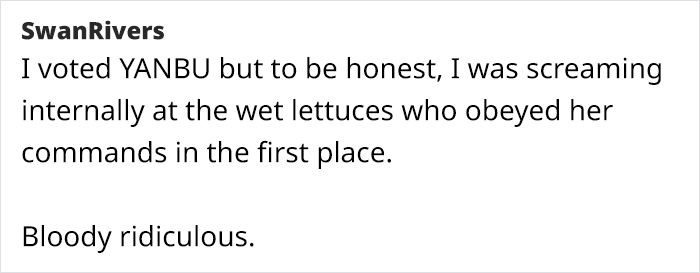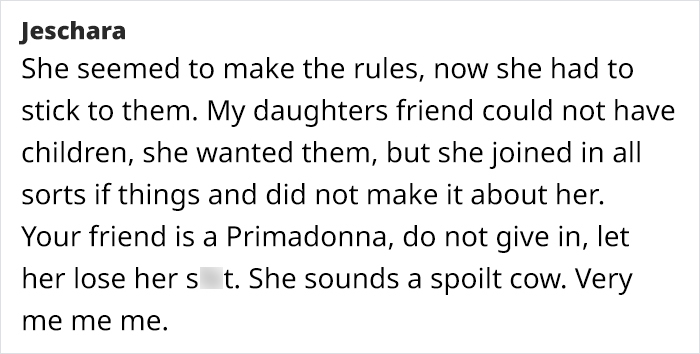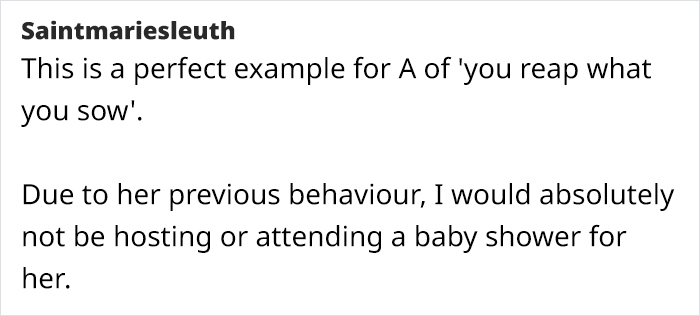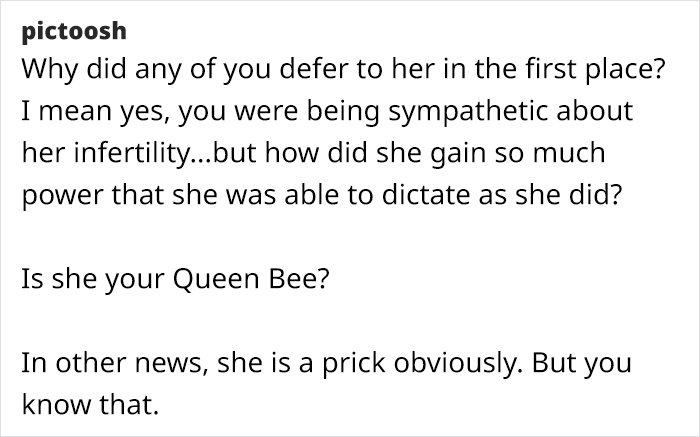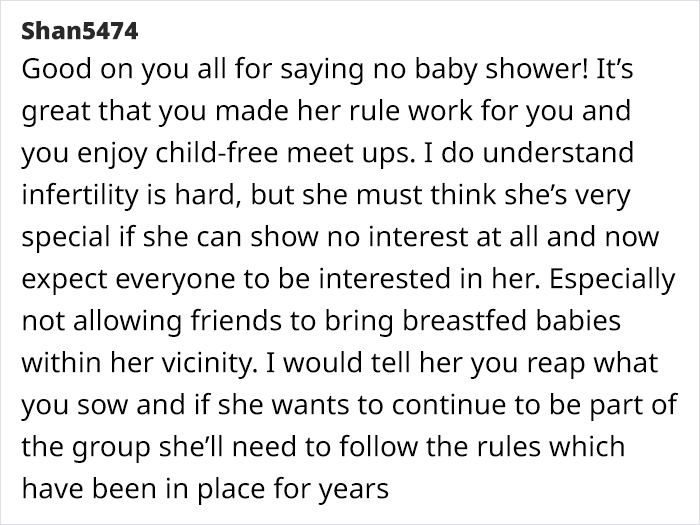When you become a parent, it might be difficult to think of anything to talk about other than your little one. Especially for the first few years, your kiddos can easily consume your life, as they need nearly constant attention. Not to mention the fact that you’ve probably never been more excited about anything in your entire life than being a mom or dad.
But despite how much you love your children, not everyone wants to hear about them. That’s why one friend group agreed that when they meet up, talking about kids is off limits. And this rule worked quite well, unless their “infertile” friend suddenly got pregnant. Below, you’ll find the full story that was recently posted on Mumsnet, as well as conversations with writer and parenting specialist, Pamela Li, and Sue Fagalde Lick, author of Childless by Marriage.
This woman’s friend group agreed that nobody was allowed to discuss their children when they met up
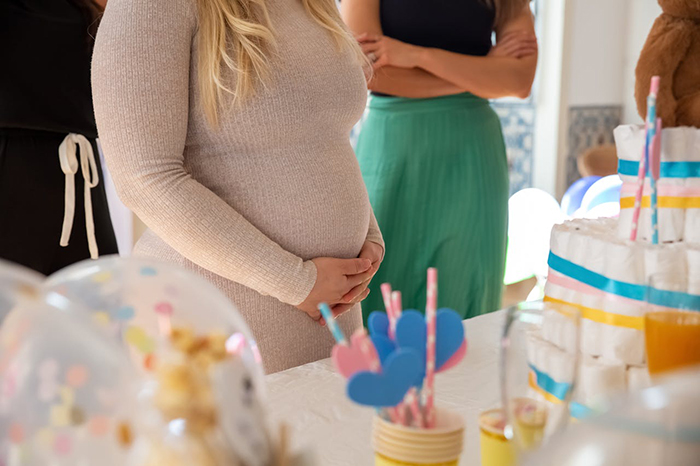
But when a previously “infertile” friend became pregnant, she suddenly decided that the rules don’t apply to her
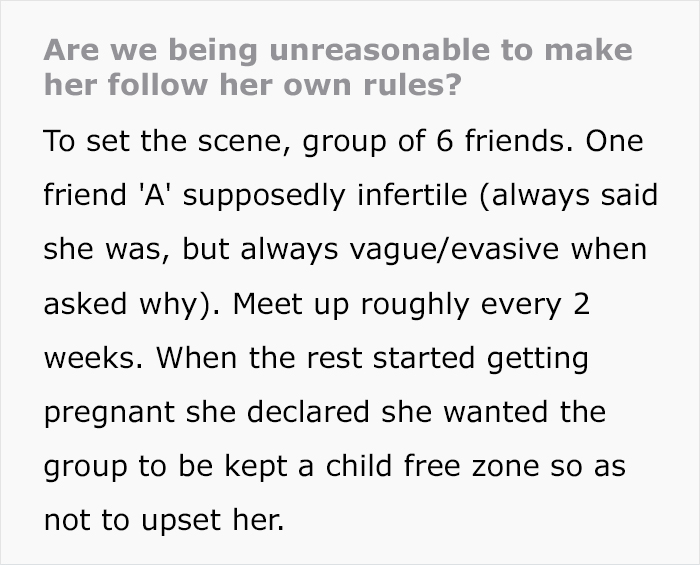
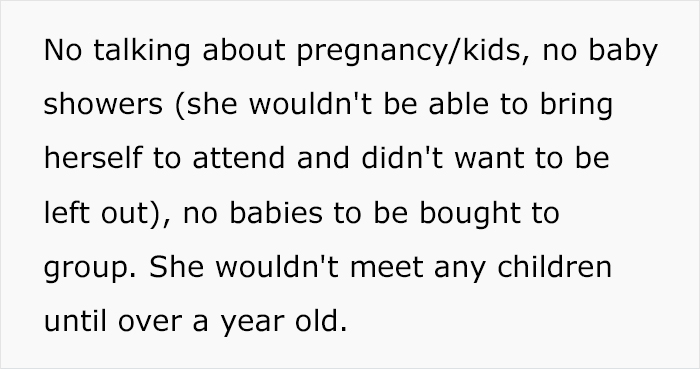
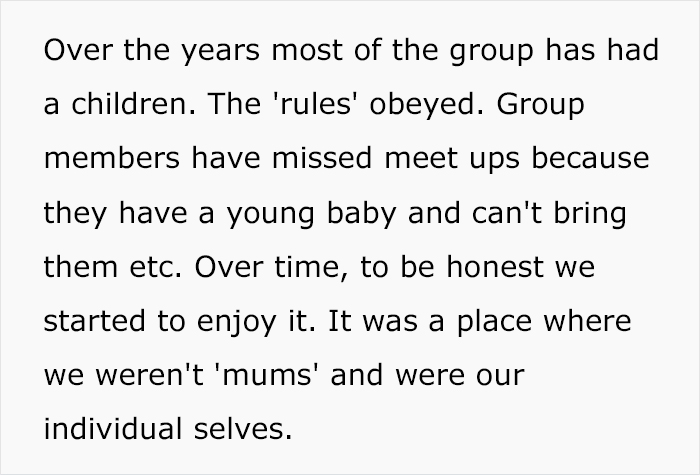
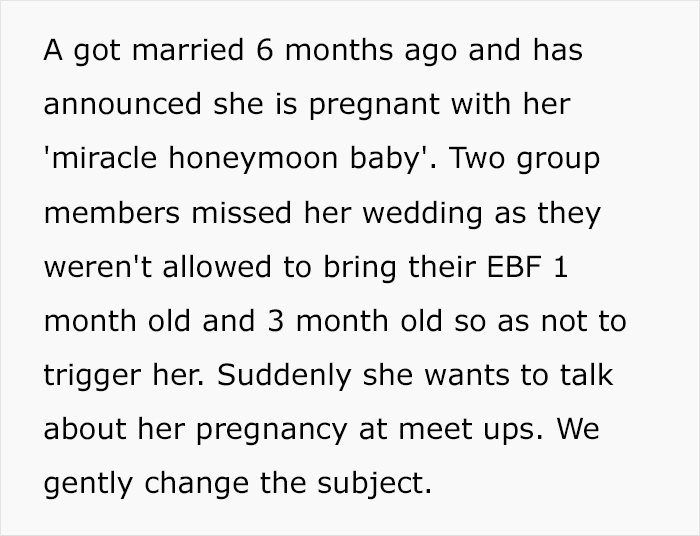

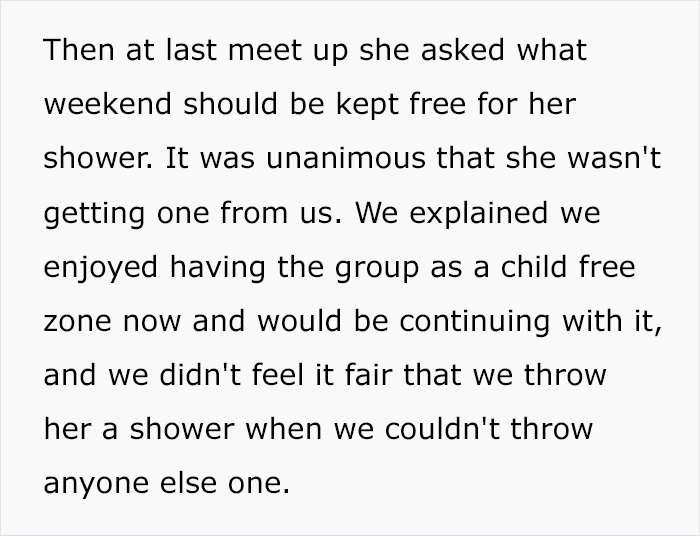
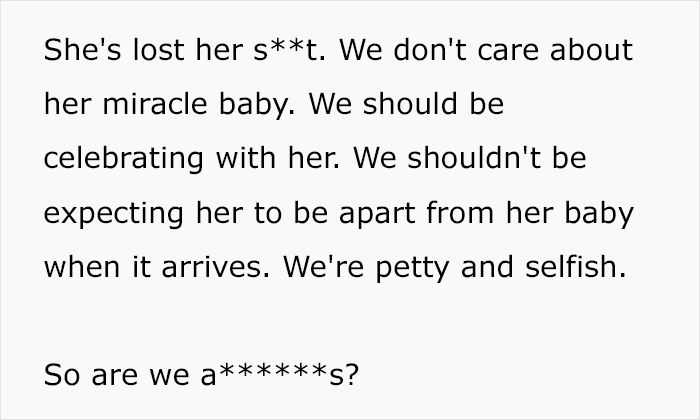
“Having a dedicated space to talk about your own interests and passions is refreshing and lets you get a piece of your old self back”
To gain more insight into this topic, we reached out to writer, parenting specialist and creator of Parenting for Brain, Pamela Li.
“When you first become a mom, everything naturally revolves around your child. Your conversations, your thoughts, and even your social interactions become centered on your kids,” Pamela shared. “It sometimes feels like you no longer have your own life, and breaking away from that habit feels forced and awkward initially.”
“The ‘no talking about children’ rule allowed [the moms] to rediscover themselves,” the expert noted. “It’s easy for women to lose touch with the person they were before they had kids. Having a dedicated space to talk about your own interests and passions is refreshing and lets you get a piece of your old self back.”
“Not having to think about your kids, even for just a little while, gives you a much-needed mental break. You get the chance to share parts of yourselves that go beyond being moms. Having this break helps reduce the stress and mental load of parenting,” Pamela explained. “It also makes friendships richer as you’re not always talking about your children but connect more deeply about other things that matter to you and your friends.”
We were also curious about the impact that it can have on someone who can’t have kids of their own when all of their friends are starting families. “It can feel isolating and hurt, as they might experience a mix of joy for their friends and grief for their own unmet desires,” Pamela told Bored Panda. “Seeing others enter a stage of life they deeply long for can amplify feelings of loss, inadequacy, and loneliness.”
“Being infertile is a painful and helpless experience. Listening to others talk about their kids feels like standing outside a club everyone else seems to be a part of,” the expert continued. “Agreeing to make it a ‘no talking about children’ zone shows how considerate and empathetic her friends are.”
“When we’re in the throes of childless pain, when it hurts to be around children or hear constant talk about them, I think we need to be honest with our friends”
We were also lucky enough to get in touch with Sue Fagalde Lick, author of Childless by Marriage and creator of a blog by the same name, to hear her thoughts on this issue that is near and dear to her heart.
“It can be frustrating being around parents who constantly want to talk about their kids because it leaves you out of the conversation. You can’t respond with comments about your own children,” Sue shared. “If you’re in a group of moms, sometimes it feels like they forget you’re there, that if you left, they wouldn’t even notice.”
But Sue understands that it’s natural to be obsessed with one’s offspring. “I’m sure I would be if I had them. Over the years, I have tried to talk about my nieces and nephews and other children I know. I have offered stories about my dogs. But they fall flat because it’s not the same,” she added.
And although it can be painful to hear friends talk about their children, Sue doesn’t recall ever setting any boundaries around parenting conversations when her friends were starting families. “When it got to be too much, I just walked away. There was a natural division in our lives. Their lives were all about families, while mine was all about work,” she noted. “They made new friends who were moms. I made friends with men, older women, and childless/childfree women. Now we have come together again, and our mothering status does not divide us.”
However, there’s nothing wrong with bringing up the issue if it really bothers you. “When we’re in the throes of childless pain, when it hurts to be around children or hear constant talk about them, I think we need to be honest with our friends,” Sue added.
“It’s okay to say, ‘I’m happy for you, but I’m having a hard time with all the baby talk because I can’t have kids of my own. It really hurts. Can we change the subject for a while?’ Or ‘I just can’t go to your baby shower. I’d be crying the whole time, and you don’t want that. But I will send a nice gift,’” she continued. “Or ‘Our lives are going in different directions, so maybe we need to take some time away from each other.’ Be honest. Don’t bottle up your resentment and let it fester.”
“A balanced approach in conversation allows everyone to feel included and valued, regardless of their current life stage”
At the end of the day, Sue says, “We can get wrapped up in our own feelings of self-pity, grief, and anger, but if we can find the strength to love our friends’ children the way we love our friends, we can stop feeling so left out. If we can get to know the kids, get involved in their lives, and become part of the family, it can be a really great thing. Not everyone can do that. I can only do it now in my post-menopausal years, but it can work.”
Pamela also noted that completely banning specific topics, like those related to children, feels extreme. “After all, these are significant aspects of our lives, and sharing them can foster connection and understanding,” she told Bored Panda. “A balanced approach in conversation allows everyone to feel included and valued, regardless of their current life stage. This means making space for discussions about kids and parenting while sharing other interests, joys, challenges, and perspectives. Friendships become enriching rather than limiting.”
“Life’s journey is full of twists and turns, and as we navigate these changes, our friendships evolve, too. New experiences and life stages can create unexpected differences even within our closest circles. Having children, embarking on new careers, or facing personal challenges shape our perspectives and priorities,” the parenting specialist continued.
“These differences, however, maintain the value of our friendships. They offer opportunities for growth, understanding, and deeper connection. Embracing unique journeys allows us to appreciate the common ground that initially brought us together and strengthen the bonds that hold us dear. Sensitivity and understanding are essential in maintaining strong friendships through these transitions,” Pamela shared.
“Babies are pretty cool. It sucks if we can’t have them,” Sue added. “But we can love our friends’ children like we love their cats and dogs. Pet them, play with them, let them sleep in our laps, then give them back when they need feeding.”
Finally, Sue says, “As for the mum who banned all kid talk until she had her miracle baby, all she can do now is apologize profusely while her friends decide whether they can start fresh or tell her she has burned her bridges. And hell no, they won’t give her a baby shower.”
We would love to hear your thoughts on this situation in the comments below, pandas. Then, if you’re looking for another Bored Panda article discussing parenting, we recommend reading this piece next!
Readers assured the woman that she had every right to enforce the rules, calling out the pregnant friend for her entitled behavior



